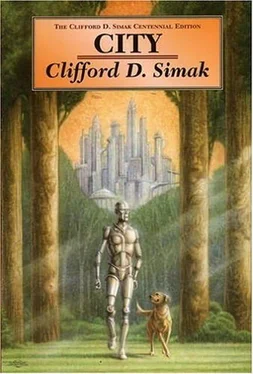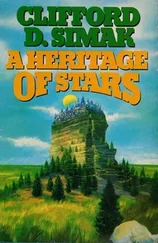Clifford Simak - City
Здесь есть возможность читать онлайн «Clifford Simak - City» весь текст электронной книги совершенно бесплатно (целиком полную версию без сокращений). В некоторых случаях можно слушать аудио, скачать через торрент в формате fb2 и присутствует краткое содержание. Жанр: Фантастика и фэнтези, на английском языке. Описание произведения, (предисловие) а так же отзывы посетителей доступны на портале библиотеки ЛибКат.
- Название:City
- Автор:
- Жанр:
- Год:неизвестен
- ISBN:нет данных
- Рейтинг книги:3 / 5. Голосов: 1
-
Избранное:Добавить в избранное
- Отзывы:
-
Ваша оценка:
- 60
- 1
- 2
- 3
- 4
- 5
City: краткое содержание, описание и аннотация
Предлагаем к чтению аннотацию, описание, краткое содержание или предисловие (зависит от того, что написал сам автор книги «City»). Если вы не нашли необходимую информацию о книге — напишите в комментариях, мы постараемся отыскать её.
City — читать онлайн бесплатно полную книгу (весь текст) целиком
Ниже представлен текст книги, разбитый по страницам. Система сохранения места последней прочитанной страницы, позволяет с удобством читать онлайн бесплатно книгу «City», без необходимости каждый раз заново искать на чём Вы остановились. Поставьте закладку, и сможете в любой момент перейти на страницу, на которой закончили чтение.
Интервал:
Закладка:
"What do you think of that son of mine?" the old man asked.
Grant started at the unusual question. "Why, I think he's splendid. The work he's doing with the dogs-"
The old man chuckled. "Him and his dogs! Ever tell you about the time Nathaniel tangled with a skunk? Of course, I haven't. Haven't said more than a word or two to you."
He ran his hands along the bed covering, long fingers picking at the fabric nervously.
"Got another son, you know. Allen. Call him Al. To-night he's the farthest from Earth that Man has ever been. Heading for the stars."
Grant nodded. "I know. I read about it. The Alpha Centauri expedition."
"My father was a surgeon," said Thomas Webster. "Wanted me to be one, too. Almost broke his heart, I guess, when I didn't take to it. But if he could know, he'd be proud of us to-night."
"You mustn't worry about your son," said Grant.
The old man's glare silenced him. "I built that ship myself. Designed it, watched it grow. If it's just a matter of navigating space, it'll get where it is going. And the kid is good. He can ride that crate through hell itself."
He hunched himself straighter in the bed, knocking his nightcap askew against the piled-up pillows.
"And I got another reason to think he'll get there and back. Didn't think much about it at the time, but lately I've been recalling it, thinking it over, wondering if it mightn't mean... well, if it might not be-"
He gasped a bit for breath. "Mind you, I'm not superstitious."
"Of course you're not," said Grant.
"You bet I'm not," said Webster.
"A sign of some sort, perhaps," suggested Grant. "A feeling. A hunch."
"None of those," declared the old man. "An almost certain knowledge that destiny must be with me. That I was meant to build a ship that would make the trip. That someone or something decided it was about time Man got out to the stars and took a hand to help him along a bit."
"You sound as if you're talking about an actual incident," said Grant, "As if there were some positive happening that makes you think the expedition will succeed."
"You bet your boots," said Webster. "That's just exactly what I mean. It happened twenty years ago, out on the lawn in front of this very house."
He pulled himself even straighter, gasped for breath, wheezing.
"I was stumped, you understand. The dream was broken. Years spent for nothing. The basic principle I had evolved to get the speed necessary for interstellar flight simply wouldn't work. And the worst of it was, I knew it was almost right. I knew there was just one little thing, one theoretical change that must be made. But I couldn't find it.
"So I was sitting out there on the lawn, feeling sorry for myself, with a sketch of the plan in front of me. I lived with it, you see. I carried it everywhere I went, figuring maybe that by just looking at it, the thing that was wrong would pop into my mind. You know how it does, sometimes."
Grant nodded.
"While I was sitting there a man came along. One of the ridge runners. You know what a ridge runner is?"
"Sure," said Grant.
"Well, this fellow came along. Kind of limber-jointed chap, ambling along as if he didn't have a trouble in the world. He stopped and looked over my shoulder and asked me what I dad.
"'Spaceship drive," I told him.
"He reached down and took it and all, what was the use? He couldn't understand a thing about it and it was no good, anyhow.
"And then he handed it back to me and jabbed his finger at one place. "That's your trouble," he said. And then he turned and galloped off and I sat staring after him, too done in to say a single word, to even call him back."
The old man sat bolt upright in the bed, staring at the wall, nightcap canted crazily. Outside the wind sucked along the eaves with hollow hooting. And in that well-lighted room, there seemed to be shadows, although Grant knew there weren't any.
"Did you ever find him?" asked Grant.
The old man shook his head. "Hide nor hair," he said.
Jenkins came through the door with a glass, set it on the bedside table.
"I'll be back, sir," be said to Grant, "to show you to your room."
"No need of it," said Grant. "Just tell me where it is."
"If you wish, sir," said Jenkins. "It's the third one down. I'll turn on the light and leave the door ajar."
They sat, listening to the robot's feet go down the hall.
The old man glanced at the glass of whisky and cleared his throat.
"I wish now," he said, "I'd had Jenkins bring me one."
"Why, that's all right," said Grant "Take this one. I don't really need it."
"Sure you don't?"
"Not at all."
The old man stretched out his hand, took a sip, sighed gustily.
"Now that's what I call a proper mix," he said. "Doctor makes Jenkins water mine."
There was something in the house that got under one's skin. Something that made one feel like an outsider – uncomfortable and naked in the quiet whisper of its walls.
Sitting on the edge of his bed, Grant slowly unlaced his shoes and dropped them on the carpet.
A robot who had served the family for four generations, who talked of men long dead as if he had brought them a glass of whisky only yesterday. An old man who worried about a ship that slid through the space-darkness beyond the solar system. Another man who dreamed of another race, a race that might go hand in paw with man down the trail of destiny.
And over it all, almost unspoken and yet unmistakable, the shadow of Jerome A. Webster – the man who had failed a friend, a surgeon who had failed his trust.
Juwain, the Martian philosopher, had died, on the eve of a great discovery, because Jerome A. Webster couldn't leave this house, because agoraphobia chained him to a plot a few miles square.
On stockinged feet, Grant crossed to the table where Jenkins had placed his pack. Loosening the straps, he opened it, brought out a thick portfolio. Back at the bed again, he sat down and hauled out sheafs of papers, thumbed through them.
Records, hundreds of sheets of records. The story of hundreds of human lives set down on paper. Not only the things they told him or the questions that they answered, but dozens of other little things – things he had noted down from observation, from sitting and watching, from living with them for an hour or day.
For the people that he ferreted out in these tangled hills accepted him. It was his business that they should accept him. They accepted him because he came on foot, briar-scratched and weary, with a pack upon his shoulder. To him clung none of the modernity that would have set him apart from them, made them suspicious of him. It was a tiresome way to make a census, but it was the only way to make the kind the World Committee wanted – and needed.
For somewhere, sometime, studying sheets like these that lay upon the bed, some man like him would find a thing he sought, would find a clue to some life that veered from the human pattern. Some betraying quirk of behaviourism that would set out one life against all the others.
Human mutations were not uncommon, of course. Many of them were known, men who held high position in the world. Most of the World Committee members were mutants, but, like the others, their mutational qualities and abilities bad been modified and qualified by the pattern of the world, by unconscious conditioning that had shaped their thoughts and reaction into some conformity with other fellow men.
There had always been mutants, else the race would not have advanced. But until the last hundred years or so they had not been recognized as such. Before that they had merely been great businessmen or great scientists or great crooks. Or perhaps eccentrics who had rained no more than scorn or pity at the hands of a race that would not tolerate divergence from the norm.
Читать дальшеИнтервал:
Закладка:
Похожие книги на «City»
Представляем Вашему вниманию похожие книги на «City» списком для выбора. Мы отобрали схожую по названию и смыслу литературу в надежде предоставить читателям больше вариантов отыскать новые, интересные, ещё непрочитанные произведения.
Обсуждение, отзывы о книге «City» и просто собственные мнения читателей. Оставьте ваши комментарии, напишите, что Вы думаете о произведении, его смысле или главных героях. Укажите что конкретно понравилось, а что нет, и почему Вы так считаете.











